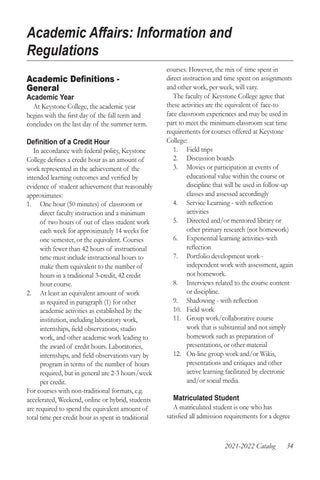Academic Affairs: Information and Regulations Academic Definitions General
Academic Year At Keystone College, the academic year begins with the first day of the fall term and concludes on the last day of the summer term. Definition of a Credit Hour In accordance with federal policy, Keystone College defines a credit hour as an amount of work represented in the achievement of the intended learning outcomes and verified by evidence of student achievement that reasonably approximates: 1. One hour (50 minutes) of classroom or direct faculty instruction and a minimum of two hours of out of class student work each week for approximately 14 weeks for one semester, or the equivalent. Courses with fewer than 42 hours of instructional time must include instructional hours to make them equivalent to the number of hours in a traditional 3-credit, 42 credit hour course. 2. At least an equivalent amount of work as required in paragraph (1) for other academic activities as established by the institution, including laboratory work, internships, field observations, studio work, and other academic work leading to the award of credit hours. Laboratories, internships, and field observations vary by program in terms of the number of hours required, but in general are 2-3 hours/week per credit. For courses with non-traditional formats, e.g. accelerated, Weekend, online or hybrid, students are required to spend the equivalent amount of total time per credit hour as spent in traditional
courses. However, the mix of time spent in direct instruction and time spent on assignments and other work, per week, will vary. The faculty of Keystone College agree that these activities are the equivalent of face-to face classroom experiences and may be used in part to meet the minimum classroom seattime requirements for courses offered at Keystone College: 1. Field trips 2. Discussion boards 3. Movies or participation at events of educational value within the course or discipline that will be used in follow-up classes and assessed accordingly 4. Service Learning - with reflection activities 5. Directed and/or mentored library or other primary research (not homework) 6. Experiential learning activities-with reflection 7. Portfolio development work independent work with assessment, again not homework. 8. Interviews related to the course content or discipline. 9. Shadowing - with reflection 10. Field work 11. Group work/collaborative course work that is substantial and not simply homework such as preparation of presentations, or other material 12. On-line group work and/or Wikis, presentations and critiques and other active learning facilitated by electronic and/or social media. Matriculated Student A matriculated student is one who has satisfied all admission requirements for a degree
2021-2022 Catalog
34

